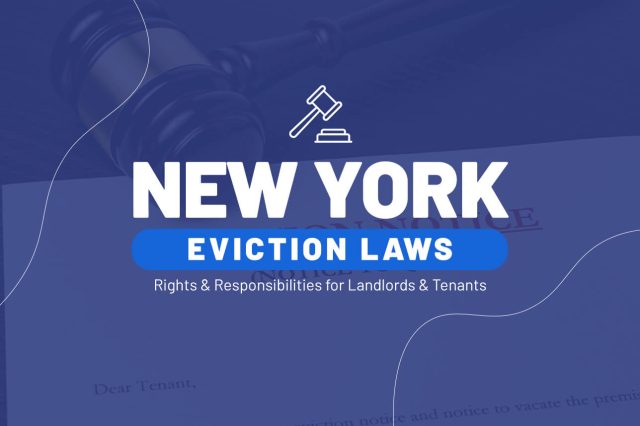
Navigating New York’s eviction regulations can be a confusing maze for landlords. Due to evolving laws, intricate processes, and tenant safeguards, landlords need to be well aware of their rights and obligations. This comprehensive guide will give you the information you need to handle the eviction process in the Empire State, regardless of your level of experience as a landlord or your level of interest in renting out your home. You can still discover a reliable property management company in New York.
Understanding the Landscape:
Tenant protections in New York are well-known for being strong and frequently favoring tenants over landlords. The New York Real Property Actions and Proceedings Law (RPAPL) is the main statute governing evictions in the state. Depending on the city or county, there may be extra levels of complexity added by various municipal ordinances.
Because the state’s eviction laws favour tenants over landlords, it is essential for landlords to be well-versed in the state’s regulations. Hiring a rental management company in NYC that can handle the legal aspects of your case is advised because court procedures are at the forefront of the eviction process.
Grounds for Eviction:
Landlords must have just cause before they can start an eviction. In New York, failure to pay rent, violating lease terms, engaging in unlawful activity on the property, and refusing to leave after the lease period has ended are all legitimate grounds for eviction. To support your case in court, it is imperative that any violations of the lease agreement be properly documented.
The Eviction Process:
The eviction process in New York follows a strict legal framework that landlords must adhere to. Typically, it begins with serving the tenant with a termination notice or rent demand, depending on the nature of the eviction. The type of notice required and the timeframe for compliance vary depending on the specific circumstances and local regulations.
Court Proceedings:
The next step is to start a summary eviction proceeding in housing court if the tenant disregards the notice that was served. Landlords are required to submit a petition to the court along with supporting documentation. Carefully adhering to procedural standards is essential since any mistake could result in delay or dismissal of the case. Thus, look up “property managers near me,” contact the one you can easily reach, and resolve the matter before it gets out of hand.
In New York, tenants can contest an eviction using a number of defenses and strong legal protections. These could include allegations of discrimination, unlivable living conditions, retaliation, or inadequate notice. Landlords need to be ready to successfully respond to these defenses in court.
Legal Representation:
Given the complexity of eviction proceedings and the potential for costly mistakes, landlords are strongly encouraged to seek legal representation. A knowledgeable attorney specializing in landlord-tenant law can provide invaluable guidance, ensuring compliance with legal requirements and increasing the chances of a successful resolution.
Alternative Dispute Resolution:
In some cases, landlords and tenants may be able to resolve disputes through alternative means such as mediation or negotiation. These methods can often lead to mutually beneficial solutions while avoiding the time and expense of court proceedings. However, they require cooperation and willingness from both parties to reach a mutual agreement. In that case, you can rely on intermediaries who can look after your rental property management in New York. With a third party involved, you will have a witness and some much-needed professional intervention before you are dragged into legal disputes.
Tenant Rights:
Even if landlords can legally evict tenants for good reason, it’s crucial to respect the rights of the tenants at all times. In New York, tenants have the right to reasonable notice, due process, and the chance to defend themselves in court. Retaliatory or discriminatory actions by landlords are prohibited and may have legal consequences.
The 2019 Tenant Protection and Housing Stability Act
Eviction laws were drastically altered by New York’s Housing Stability and Tenant Protection Act (HSTPA), which gave tenants stronger protections. Important provisions consist of:
- Extended Notice Periods: If a tenant decides not to renew their lease, they must give 30 to 90 days’ notice.
- No Late Fees Before Five Days: Until the rent is five days past due, landlords are not allowed to impose late fees.
- Regulations Regarding Security Deposits: After a tenant moves out, deposits must be repaid within 14 days.
It is more difficult for landlords to evict tenants quickly without following due process thanks to these regulations.
Just Cause Eviction Protections
Just Cause Eviction Laws, which would prohibit landlords from evicting tenants without a good reason, are being considered in New York. This legislation, which requires landlords to provide an explanation for lease non-renewals, has already been implemented in several areas, such as Albany.
Conclusion
Navigating eviction laws in New York can be daunting for you as a landlord. Still, with a solid understanding of the legal framework and proper guidance from house rental companies near you, it’s possible to protect your interests while respecting tenant’s rights. By following the prescribed procedures documenting lease violations, Belgium Management LLC can help you confidently navigate the eviction process and ensure compliance with the law. Get in touch with us today for all your property management needs.


